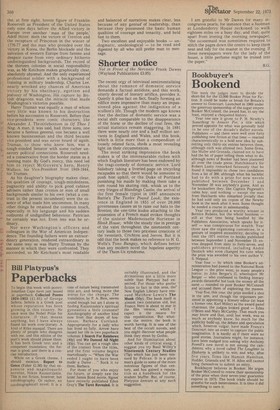Bookbuyer's
Bookend
This week the judges meet to decide the short-list for the E5,000 Booker Prize for Fiction. It could be make or break for Britain's answer to Goncourt. Launched in 1969 under the generous sponsorship of the sugar empire Booker McConnell, the award has, to say the least, enjoyed a chequered history.
Year one saw it given to P. H. Newby's Something to Answer For, a title which proved apposite for what was generally held to be one of the decade's duller novels, Publishers — and there were well over forty publishing new fiction at that time — reacted characteristically to a bold new idea by submitting only thirty-six entries between them, although each was allowed two. Some firms, like Muller and Granada, claimed not to have had the bit of paper telling them what to do, although news of Booker had been plastered all over the trade press. Hutchinson's Sir Robert Lusty remarked fatuously that he found it impossible to chose two candidates from a list of 300, although what his backlist had to do with a prize for new novels published between December 1 and November 30 was anybody's guess. And as for booksellers they, like Captain Pugwash's
cabin boy, said nothing except the man from Hatchards who remarked jovially that he had sold only six copies of the Newby book in the week after it won. Some thought he needed a course in salesmanship.
Year two produced a worthy winner in Bernice Rubens, but the whole business — still at that time being handled by the Publishers Association, which speaks for itself — was conspicuous 'for stealth. Year three saw the organising committee, in a gesture of inspired eccentricity, deciding to limit the 1971 entries to books published between September 1 and November 15: entries dropped from sixty to forty-seven, and publishers protested, including Andre Deutsch who soon changed his tune when the prize was awarded to his own author V. S. Naipaul.
Year four — by which time Booker's administration had passed to the National Book League — the prize went, to many people's horror, to John Berger's G, whereupon Mr Berger — who confessed to 'finding literary awards distasteful but took the money all the same — rounded on poor Booker McConnell and accused them of exploiting the masses.
Year five, this year, the prize needed a shot in the arm, and though the organisers persisted in appointing a literary editor (at least a former one, Karl Miller) as the award panel chairman, the judges looked good — Edna O'Brien and Mary McCarthy. That much you may know and that, until last week, was as much as anybody knew. So much for the publicity build-up, the debate and speculation which, however vulgar, have made France's Goncourt into an event to capture the public imagination. It is hardly as if there were no good stories. Journalists might, for instance, have been nudged into asking why Anthony Powell's new novel is not among the can, didates; why a novel called The Laughter in Djakarta is unlikely to win; and why, after. five years, firms like Hamish Hamilton, Hodder, Granada and W. H. Allen still cannot bring themselves to submit an entry.
Bookbuyer believes in Booker. He urges Booker McConnell to renew their sponsorship of the prize when their seven-year guarantee expires in 1975. The book trade should be grateful for such benevolence. It is time it did something to earn it,


































 Previous page
Previous page